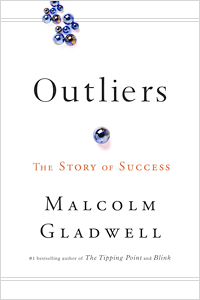This review contains affiliate links, which earn me a small commission when you click and purchase, at no extra cost to you. Thank you for supporting my small business and allowing me to continue providing you a reliable resource for clean book ratings.
I had never heard the term “outlier” before reading Malcolm Gladwell’s book, but I will admit that it involves a subject I have pondered for many years. The author defines an outlier as a person or a group who is classified differently than we average humans: not necessarily geniuses, but simply those whose accomplishments place them outside normal boundaries. Bill Gates, The Beatles, professional athletes, New York lawyers, and others are all identified as outliers. Gladwell is simply trying to answer the age-old question: how did these elite performers become who they are? Genetics? Environment? Opportunity? Sheer dumb luck?
Outliers is divided into two sections: Opportunity and Legacy. In the first part, the reader is exposed to a variety of different outliers (groups and individuals), along with how each one attained the level of proficiency in his or her chosen fields to earn the distinction. We are presented with nearly unbelievable stories of success, and then Gladwell proceeds to outline the details of the lives of these persons (and groups) to illustrate that, really, they are just like the rest of us, with only minor exceptions. In fact, in nearly every case, it comes down to two things: The strength and presence of mind to seize specific opportunities, and the willingness to focus their energies for hours. Ten thousand hours, to be precise.
A fair amount of luck is involved as well, which is almost eerie as it is described in these situations. For example, most of the outliers in Canadian professional hockey were born in the months of January, February, and March. (The explanation is fascinating.) The titans of American wealth and industry in the 19th century were all born within a nine-year window. (That explanation is equally fascinating.)
The second section (Legacy) deals more with those who would like to learn from the lives of outliers and create their own opportunities, either for themselves or on behalf of a specific group.
This is an extremely thought-provoking and easy read. The author does a great job of explaining that talent alone does not create an outlier. Neither does opportunity, although that is often a necessary ingredient. In every case, it is clear that hours and hours of effort are necessary for success, and that such work is only a prison sentence if it has no meaning to the individual.
Rated: Moderate. Eleven instances of profanity; mostly they are mild terms, but a few coarser words are found here and there. All but one are quotes from interviews.





Pingback: What the Dog Saw and Other Adventures | Rated Reads